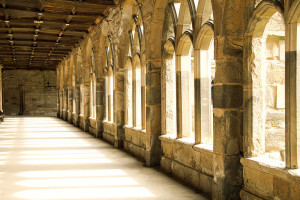Today is a beautiful sunny Maundy Thursday in Durham. In light of the day, we’re reposting this Flower from a few years back:
How did the medieval monks of Durham celebrate Maundy Thursday?
A work known as the Rites of Durham – a mid 16th-century account of the earlier, pre-Reformation rites and practices of Durham Priory (now Durham Cathedral)* – records an intriguing but appropriate ceremony carried out by the monks for Maundy Thursday.

Durham Cathedral MS A.II.10, fol. 224v. © . Chapter of Durham Cathedral. Decorated initial from Peter Lombard’s commentary on the Psalms.
The ceremony involved three parts: the washing of the feet, the setting up of the Paschal Candle, and the Judas Cup. The first of these started at 9 in the morning, when 12 poor men were brought into the cloister and were seated on a ‘broad thicke fourme’ or bench supported by three wooden pieces which was brought in from its usual place between two pillars standing over and against the south quire door.
Professor John McKinnell summarizes the description in the Rites:
‘[each man] had their feet washed, dried and kissed by the prior, while each of the monks did the same for one of a group of boys seated on the south side of the cloister. The old men and boys then received a meal, at which they were served by the prior and monks personally; they were each given three loaves, seven red herrings, “certain wafer-cakes” and thirty pence. […]
The prior is imitating Christ washing the disciples’ feet at the Last Supper (John 13:4-10); but he is not presuming to impersonate Christ, for he washes the feet of thirteen men (representing the disciples plus Christ), not twelve. The monks, in each washing a boy’s feet, are recognising the presence of Christ in the least of human beings (Matthew 25:40)’.**
The text of the Rites of Durham records this part of the ceremony as follows:
There was a goodlie ceremonye which ye prior & the Mounkes dyd use euery Thursdaie before easter called maundy thursdaie, the custoume was this:

Durham Cathedral Cloister, interior
ther were xiijo poore agen men appoynted to come to ye cloyster as that daie, havinge there feete clene washed there to remayne till such tyme as ye prior & the whole covent dyd come thether at ix a clock, or ther aboutes, ye agen men sytting betwyxt ye parler dour & ye Church dour, upon a fair longe broad thicke fourme, which fourme laie on iijo peces of wood, euery pece pictured like unto a man antick wourke verie fynely wrought, being placed for ye feite of ye fourme, in vnder either end one, & one in ye myddes, which fourme dyd stand alwaies in ye church beyond ye Revester dour betwixt two pillers ouer & against ye quere doure on ye southsyd of ye quere,
which fourme was taiken & caried euery maundie thursdaie before easter to ye cloister, where ye prior after certaine praiers said, one of his servantes did bring a fair baison, with clene water, & ye prior dyd washe ye poore mens feete, all of theme, one after an other with his his owne handes, & dryed them with a towell, and kissed ther feite hime selfe, which being done, he did verie liberally bestowe xxx d. in money of euery one of theme, with vijo reade herringes a pece, and did serve them himselfe, with drinke & vijo loves of bread, with certaine wafers,
and when all was done ye forme which was ordayned onely for that purpose, was caried againe into ye church, & sett in ye same place where yt was taken fro that men might also sit on yt ther, when they came to here devine service . / [which fourme is yet remaymynge under ye te deum wyndowe & the clock]***
This dramatic re-enactment of the washing of the feet was accompanied by the lighting of the great Paschal Candle – an enormous candelabra of seven candlesticks (the central one almost reaching to the cathedral vault!) – as well as the ceremony of the Judas Cup – a mazer of double gilt silver, from which the prior would distribute wine to the monks in imitation of the Last Supper.****
For more information on the architecture of the Cathedral mentioned in the extract, including the cathedral cloister, the Te Deum Window and Prior Castle’s 16th-century clock, go to https://www.durhamworldheritagesite.com.
*More information on the manuscript of the Rites of Durham may be found here: https://www.durhamworldheritagesite.com/history/rites-of-durham.
**John McKinnell, The Sequence of the Sacrament at Durham (The University of Teeside, 1999), p. 11.
***The text comes from the Rites of Durham, being a description or brief declaration of all the ancient monuments, rites, & customs belonging or being within the monastical church of Durham before the suppression: Written 1593, ed. J. T. Fowler, Surtees Soc. 107 (Durham: Andrews & Co., 1903), pp. 77-78 (‘XXXVII. THE CLOISTER. MAUNDY THURSDAY.’).
****McKinnell 12-13.


Thanks for the post. Interesting
Thanks for the post and bibliography.